Vacations in Europe have generally been relaxing breaks to take in mountain or coastal scenery but for a few city breaks when we usually admired pretty buildings. This trip was not one of those as in the middle of a tourist spot, I found myself crying overcome with emotions. Also after this trip, I wondered why London streets were so narrow and considered the possibility of relocating from UK to Germany. And to think this destination was not even on my list but selected by Lakshman due to his fascination with the history of Second World War. Here is a glimpse of the city.
 |
| Beautiful bank of River Spree |
Since we had booked an early flight, we took a taxi to Stansted airport and got tempted to eat breakfast at Wetherspoon which proved rather costly considering it was Wetherspoon. The airport prices turned out to be 2-3 times that of their regular pub price. The flight was uneventful except for a lovely nap and the train from the airport to city centre was easy to navigate to. We caught glimpses of the Berlin City attractions on the way in from the airport and got thoroughly excited. A band started playing in the city metro to get some spare change from passengers. Doesn't it sound wonderful?
We arrived a few hours early at the hotel but they kindly allowed to check in. I had a further nap to recover from the early start that morning and we went out in the early evening to visit the Victory column. We climbed up a lot of rickety spiralling stairs and thoroughly enjoyed these wonderful views. They also had a mini exhibition with models of various famous historic buildings that were fun to recognise. The victory column predated World War II and the Berlin wall. It was in fact erected as a relic of a Danish-Prussian War in 1864.
 |
| As we approached the Victory column from the subway, they were photographing a trophy with this background |
 |
| The lovely column with a golden Victoria - see the tourists below for scale |
 |
| Pleasing city views from atop the Victory Column |
 |
| Art in the column walls |
 |
| Berlin preparing for a marathon |
 |
| Gotta love the symmetry |
We walked through the Tiergarten park where climate change protesters had camped for a long term protest.

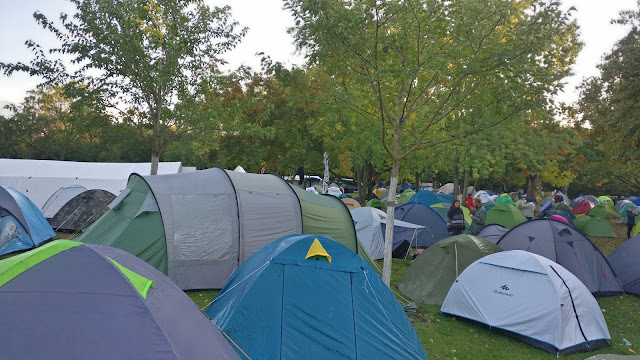
There were also protests in front of Reichstag due a recent synagogue attack (unfortunate incident, everyone thought we were past this). We could not go in as the bookings to get into Parliament had filled up weeks in advance.
Satisfied with an exterior view, we took the metro to Brandenburg gate, the very famous sight where US President Ronald Reagan made a moving speech about opening the gate and tearing down the Berlin wall in 1987.
 |
| Mr. Gorbachev open these gates! |
 |
| Mr. Gorbachev tear down these walls!! |
We ended up at McDonald's for dinner and I chose an absolutely horrible vegan burger as they didn't have a vegetarian one. Seriously it tasted like hard rubber. Promising that this will be the only meal at McD during this trip, we went back to the hotel where I did not sleep particularly well due to a paper thin pillow.
We were staying near the Zoo but did not fancy paying a big entrance fee, especially since this city had so much more to offer and plenty of it for free.

The next day, Lakshman booked us on a free (tip based) walking tour. We bought take away pizza slice for breakfast and devoured it on our way. Since we reached the meeting point early, we hung around the beautiful buildings in the area.
 |
| Old ruins in the city under renovation |
 |
| Looking forward to better days for this city and the world |
 |
| Another impressive museum and the meeting point of the walking tour |
 |
| Yo fierce warrior! |
 |
| Berlin Dome Cathedral (spoiler alert - we climb up this Dome later) |
The walking tour was about the rise and fall of Third Reich and I learnt more about the horrors of World War II in those couple of hours from the Portugese guide than I had learnt in school. The story started with how Germany lost at World War 1 (WWI) and had unfair conditions thrust upon it as part of the Versailles treaty. During that war, Adolf Hitler had been an errand boy who along with the rest of Germany could not process their failure and the resulting financial crisis. There had been a massive drop in the population after WWI and Jews were welcomed into the country to settle in but were provided accommodation in a swamp outside the city walls. Not a great start.
Hitler himself had humble beginnings in Bavaria, Germany, his dad died early and mother died of cancer during his teens after which he had collected orphans allowance. He used to go into opera halls to keep warm during winters and learnt a lot about how acoustics work and how to engage audience with speeches, which played a big role in his success as an orator.
He formed a political party and went to jail for causing trouble in 1923 when he wrote Mein Kampf. On his return back to society, he formed a new political party focused on a democratic representation of the people at the parliament, the unfairness of Versailles treaty to Germans and how they needed to stop relying on America for funds to run their country. This claim was substantiated by the 1929 depression when the funds stopped flowing in from the US. Since he was already talking about this issue, this increased his popularity and majority in Government and helped to build a connection with top people in military, police etc.
Hitler's share of power grew to 37% and a coalition government was formed with the President, who initially assured that the ruling party and not Hilter was in control of the Government. Soon though, after a possibly threatening SS visit to his private quarters, the President gave control of the Government to Hitler as the chancellor and stepped down from power. After Hitler assumed the top job, a "supposed" communist man burned the Reichstag building as part of a terrorist attack. He was found with fuel residue on his clothes and a set of matches right outside the building. What a clever ruse.
Due to this perceived Soviet threat to Germany (clearly engineered by Hitler for self interest), an emergency state was declared for 4 weeks to investigate the event. After that, about 4,000 people, made up of Hilter's enemies and political opponents, were "arrested" in suspicion of communist activity. After the four week period, due to continuing perceived Soviet threat, Hitler got the Parliament to approve an indefinite state of emergency (to do whatever he wanted without the need to answer to anyone). He got the Jews in the country to register with the Government for their own safety but this list was later abused to track down and murder them. (Harry Potter fans - does the Muggle born registration commission sound familiar?)
Basically, he found anyone who was Jewish, Black, Disabled, Gypsy or Homosexual to be undesirable to the perfect society of Aryan soldiers he wanted to live in and so he sent them to labour camps where they were used as slave labour, given measly meals and made to work under horrible conditions or abused and killed for sport. The Jews and Black people were made to do rigorous daily exercise and anyone who dropped from exhaustion during exercise was deemed physically useless and killed on the spot. All this is also shown in the movie - Schindler's list, which I recommend you watch when you want your faith in humanity restored.
Disabled people were considered a drain on national resources and sent to be killed. Gypsies were used for human experiments including connecting twins blood streams and injecting them with deadly viruses to see if they could fight it as a team using their connected bloodline. Of course, they didn't survive.
Due to curiosity about the pale shade of their irises, the Gypsies were tortured by inserting pigments into their light eyes. Human experiments included testing and documentation of how long a human could live without water, how long a human could survive with certain wound types, etc just for research purposes. Male homosexual people were used as punching bags for officers and subject to sexual cruelty including castrations. The horrors don't even end there.
SAPO considered execution by guns rather expensive at the cost of one bullet per person that they wanted to kill. Also due to underlying humanity, the soldiers were affected by constant shooting and many purposely missed their targets. As a result to industrialise the whole process and take the human element out of the equation, gas chambers were built to kill 2,000 people a day for ethnic cleansing to promote Aryan supremacy. I was ready to vomit by this point in the tour and history lesson.
During the course of his power, there were 23 failed assassination attempts on Hitler and each failed attempt only served to amplify his own self importance. One particular assassination attempt was in Munich when all the party leaders assembled and a bomb was all set to decimate the leadership completely. It was one year in the works and only missed killing Hitler by 13min due to weather related change to his travel plans. This is documented in the movie Valkyrie (starring Tom Cruise).
Finally US, UK and Russia joined forces to bring down Hitler's rule and Berlin was nearly completely destroyed in the Spring of 1945 through aerial bombing.
Hilter and his army used a cocktail of drugs that made them keep going during wars. So drug factories were targeted first by the Allied forces which made the soldiers go into drug withdrawal, another factor that made them lose. Hitler retreated to an underground bunker in his final days, married his girlfriend Eva a few days before his death and committed suicide by gun.
 |
| Furher bunker, currently functions as a parking lot - this can't be deglamourized anymore |
All this morbid history is a lot to take in but the Germany of today has the right attitude. There is a €2,000 fine if anyone makes the hail Hitler symbol. No one dares to name their kids Adolf either. Germany officially asked for Poland's forgiveness in 2019 for what was done to them. The German government has a strategy of - don't glorify, don't deny and never forget what happened. History is taught honestly in schools with a strong message of not to fuck up again. They were just as horrified at what was allowed to happen in a democratic country and are vigilant against any threats.
 |
| Luftwaffe office |
The old Luftwaffe office was turned into the finance dept office, all the inlaid svastikas in the stones were flipped around so no one had to look at them. Many buildings pierced by bullets were left as such and tiny squares of metal memorials incorporated on footpaths in front of homes of deceased. There are memorials to victims of the war in many places in the city.
 |
| Memorial to victims of WWII |
 |
| Individual tributes to victims in front of their residences, embedded into the footpath. Personalised and many thousand unmissable signs of regret. |
 |
| Bullet holes from WWII still visible on building outer walls |
German Government, on its own expense, has built memorials for Jews, Homosexuals, Disabled and Gypsy folk, they are yet to build one for black people. These attempts by the Government openly confirm their regret. They cannot make amends for sins of forefathers but it is a step in right direction towards equality and tolerance of all. I mean the British are yet to apologise for colonising the world.
 |
| Jewish Holocaust memorial, stone's throw from Reichstag |
 |
| Height of the tombstones signified to me the magnitude of the loss, six million victims. No words can explain the overwhelming grief at this sight. |
 |
| Just :( |
After the tour, with all that history in my head, I ended up crying at the Jewish Holocaust memorial. Jews apparently stacked their dead in the cemetery keeping families together and when the height of some of the tombs rose to about twenty feet, I could not take the tragedy anymore. Why were humans so horrible to each other? At least 6 million people had died due to calculated intentional cruelty. It was so unfair.
But today's Berlin is a well off booming city. I'm amazed at how they have recovered from this dark WWII history and further problems caused by the cold war and the Russian wall (more on that later). They have risen up as the superpower in Europe and an automobile giant. Perhaps the locals have found ways to live around the history, like how I work around the corner from Tower bridge in London. Underground railway stations have pictures from different eras and evidence of the city in various stages of destruction.
All this history made me view critically the subtle intolerances and discrimination that existed even today based on nationality, financial status and worse in India, based on caste. How can we judge anyone based on the pure chance of which family they were born into? No one has the right to force their views on others, especially when someone choses a mate from outside the acceptable "norms". Yet it still happens around the world even today. Isn't that just another variant of this racial supremacy nonsense? I was shook up.
We parted with the tour group and I tipped the tour guide generously, like how Chandler from Friends tries to tip at the restaurant, a note hidden in a handshake. This tour guide gave a history lesson that will stay with me forever and changed how I think about certain things in life. A much better job than any history teacher had ever done.
After an emotional morning, we needed some time-out to recover so we went a long way in the metro for a big lunch at an Indian restaurant called Aapka. It was more like supper since we got there at 4.30pm.

After that we headed off to see the East side gallery, the remains of the Berlin wall decorated with stunning Street art.


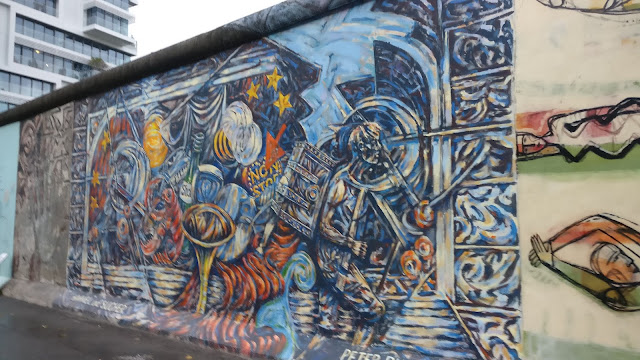


The world is indeed too small for walls.
The exhibit ended at this lovely old bridge. We had some ice cream to cheer up and returned to the hotel after 23km of walking. The day had been taxing on many levels, not just physically.

The next day, we had eggs for breakfast in a cafe and headed off to Checkpoint Charlie, another memorial of the Russia occupied Germany.
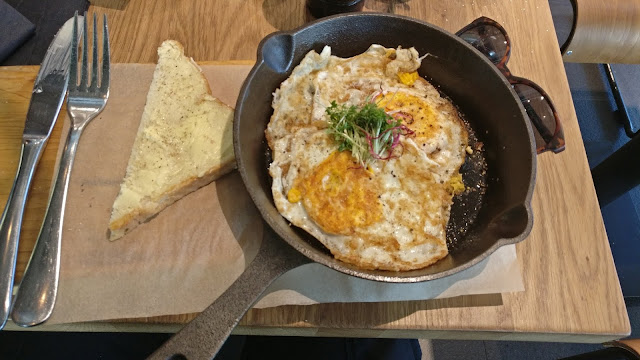
 |
| Checkpoint Charlie, border between East and West Berlin |
 |
| Where once the Berlin wall stood |
We spent the morning in the museum and I was once again horrified at the sufferings of Germany. Hitler was gone but the Allied forces divided up Germany and Russia took its claim too seriously and enforced control through the Berlin wall and caused a lot of pain and grief to an already scarred nation. I was reminded of the tamil lyric - thee patta kayathula thel vandhu kottudhadi kanmani (A scorpion bite on top of a fire burn). How was this country so prosperous after such recent violence and struggle? Incredible resilience!
I had a not so good slice of pizza for lunch at Alexanderplatz. We had planned to go up the TV tower but had to wait for 4hours to do this. Since we had seen aerial city views from the Victory column already, we decided to skip this.
 |
| Imposing TV Tower |
We took a tram, just to try that mode of transport too, to get to the Berlin Dome Cathedral. We went on an inside tour of the gorgeous building, saw fancy tombstones of church elders in the cathedral crypt, climbed to the top of the museum dome for beautiful views and relaxed in front of the museum for a while with coffee.

 |
| Crypt with tomb stones |
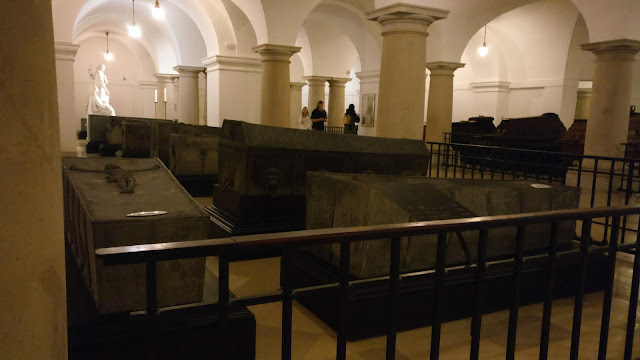
 |
| Views from atop the Berlin Dome |

 |
| Stunning cathedral and a soaring eyesore behind that |
We then took a bus to the Topography of Terror museum and spent the evening there. The gory exhibits of WWII with undeniable photographic evidence of the killings and the free audio guide that narrated the stories brought the whole horrible Hitler story to life again.
 |
| Spacious museum with photo exhibits narrating the entire WWII story with proof |

There were many portrait shots of people who were killed during WWII, many photos of the actual killings happening and piles of dead bodies across Europe. There were many instances of women being publicly shamed for being involved with Jews and taken around towns on donkeys. The evidence was very visual and horrifying. At one point, I took Lakshman to a bench and tearfully stated the obvious - this guys kills everyone.
This museum is the absolute height of Germany's regret over the past. They were accepting all the blame for the mistakes of the past and showcasing the evidence in a free for all to enter museum and also providing a complementary audio guide to narrate the story. This repentant attitude was admirable.
 |
| Our heartfelt few words in the museum guest book. My message in Tamil says - After seeing the evidence of so much horror, not just my eyes but my heart weeps too. |
We walked around the posh locality near the zoo and bought Chinese takeaway for dinner. I just felt overwhelmed by the history of Berlin and their resilience at acknowledging the history as well as successfully overcoming it to great prosperity. How amazing is Germany?
On the last day of our trip, we had a lazy start and went to on a boat tour from the Berlin Dome Cathedral (after a breakfast of Gelato). The city was stunning from this point of view and more stories emerged during this tour.
 |
| Museum island which we did not get the time to visit on this trip |

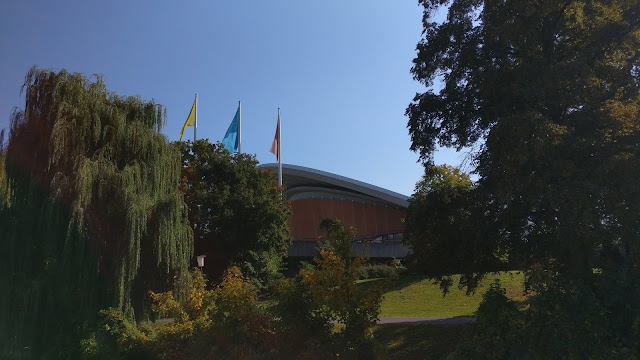
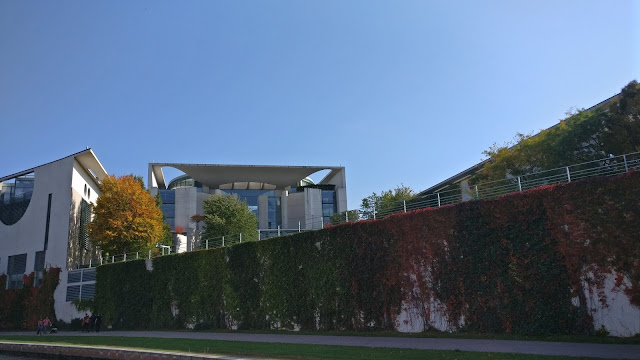
We took a bus back to the hotel to collect our luggage and walked past the zoo (sighting some animals en-route) to Tiergarten station to catch a train to the airport.
I found the train system in Berlin more impressive than even London Underground. We had bought a 3-day pass and after validating the ticket at the airport station, we didn't even have to swipe in or out as the system operated on trust. We did not come across any ticket checkers during our stay. The trains themselves were very modern and clean with TV units showing the route and highlighting the next station clearly. German efficiency indeed!
The roads in Berlin were super wide and the main roads looked almost like motorways. The cars were all from super posh brands and there were plenty of shops clearly doing good business. We had travelled extensively to different neighbourhoods of the city and they varied between Canary Wharf and Kensington in terms of prosperity.
As we flew back to London, I knew I had found another city/country that I could live in due to its admirable attitude, obvious prosperity and was so lovely that it shone like a diamond. Guten Tag Berlin! 💓💓




No comments:
Post a Comment